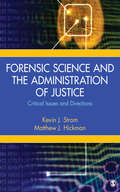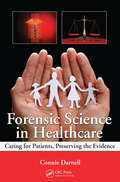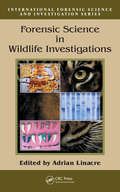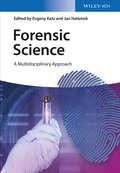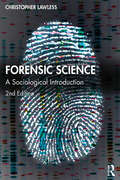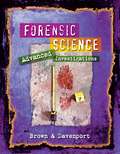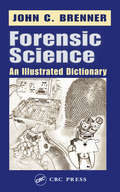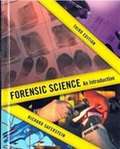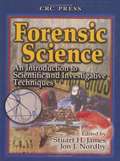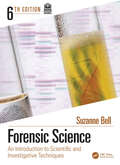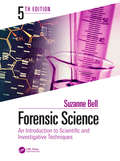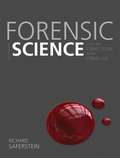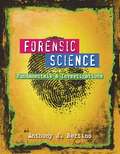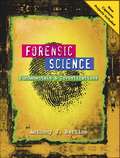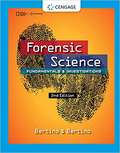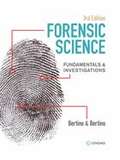- Table View
- List View
Forensic Science and the Administration of Justice: Critical Issues and Directions
by Matthew Hickman Kevin StromUniting forensics, law, and social science in meaningful and relevant ways, Forensic Science and the Administration of Justice, by Kevin J. Strom and Matthew J. Hickman, is structured around current research on how forensic evidence is being used and how it is impacting the justice system. This unique book—written by nationally known scholars in the field—includes five sections that explore the demand for forensic services, the quality of forensic services, the utility of forensic services, post-conviction forensic issues, and the future role of forensic science in the administration of justice. The authors offer policy-relevant directions for both the criminal justice and forensic fields and demonstrate how the role of the crime laboratory in the American justice system is evolving in concert with technological advances as well as changing demands and competing pressures for laboratory resources.
Forensic Science and the Administration of Justice: Critical Issues and Directions
by Matthew Hickman Kevin StromUniting forensics, law, and social science in meaningful and relevant ways, Forensic Science and the Administration of Justice, by Kevin J. Strom and Matthew J. Hickman, is structured around current research on how forensic evidence is being used and how it is impacting the justice system. This unique book—written by nationally known scholars in the field—includes five sections that explore the demand for forensic services, the quality of forensic services, the utility of forensic services, post-conviction forensic issues, and the future role of forensic science in the administration of justice. The authors offer policy-relevant directions for both the criminal justice and forensic fields and demonstrate how the role of the crime laboratory in the American justice system is evolving in concert with technological advances as well as changing demands and competing pressures for laboratory resources.
Forensic Science for High School
by John Funkhouser Barbara DeslichForensic Science for High School is an innovative and unique new book for secondary school students that develops critical thinking and problem-solving skills while teaching them about forensic science.
Forensic Science in Healthcare: Caring for Patients, Preserving the Evidence
by Connie DarnellFirst responders confronted by forensic cases are forced to consider the competing concerns of administering proper medical treatment while at the same time safeguarding vital evidence. Forensic Science in Healthcare: Caring for Patients, Preserving the Evidence presents precise on-scene protocol designed to ensure that the actions of the response
Forensic Science in Wildlife Investigations (International Forensic Science and Investigation)
by Adrian LinacreBringing together the most recent literature, this book provides an in-depth look at the field of wildlife forensic examination. Offering practical guidance, it helps investigators and lab technicians decide on best methods, including a determination of when basic microscopy is sufficient, when DNA testing should occur, and what tests or combination of tests should be executed in a particular circumstance. The text illustrates how to identify the species and geographic region of origin of an unknown sample. International contributors separate truth from myth in providing information and insight regarding the wide scope of endangered animal trafficking for meats, arts, curios, aphrodisiacs, and traditional medicines.Selected Contents: CITES
Forensic Science: A Beginner's Guide (Beginner's Guides)
by Jay SiegelThe most remarkable weapon in the fight against crime, forensic science turns bullet trajectories, bodily fluids, and the very structure of our DNA into damning witnesses of our every act.Jay Siegel tracks the journey of evidence from crime scene to courtroom and sweeps away the myths to reveal the incredible complexities and surprising pitfalls of a field that is crucial to our struggle for justice.Packed with examples from real-life cases, this revised and updated edition covers all major areas of forensic science, including drugs, trace evidence, and crime scene investigation. Pathology, anthropology, and the laws that govern this evidence all come under the scalpel in a fascinating introduction to one of the most compelling elements of criminal investigation.
Forensic Science: A Multidisciplinary Approach
by Evgeny Katz Jan HalámekConcentrating on the natural science aspects of forensics, top international authors from renowned universities, institutes, and laboratories impart the latest information from the field. In doing so they provide the background needed to understand the state of the art in forensic science with a focus on biological, chemical, biochemical, and physical methods. The broad subject coverage includes spectroscopic analysis techniques in various wavelength regimes, gas chromatography, mass spectrometry, electrochemical detection approaches, and imaging techniques, as well as advanced biochemical, DNA-based identification methods. The result is a unique collection of hard-to-get data that is otherwise only found scattered throughout the literature.
Forensic Science: A Sociological Introduction
by Christopher LawlessForensic Science provides a comprehensive overview of the sociology of forensic science. Drawing on a wealth of international research and case studies, it explores the intersection of science, technology, law and society and examines the production of forensic knowledge. The book explores a range of key topics such as: • The integration of science into police work and criminal investigation • The relationship between law and science • Ethical and social issues raised by new forensic technology including DNA analysis • Media portrayals of forensic science • Forensic policy and the international agenda for forensic science This new edition has been fully updated, particularly with regard to new technology in relation to the various new forms of DNA technology and facial recognition. Updates and additions include: • Facial recognition technology • Digital forensics and its use in policing • Algorithms (such as probabilistic genotyping) • Genealogical searching • Phenotyping This new edition also reviews and critically appraises recent scholarship in the field, and new international case studies have been introduced, providing readers with an international comparative perspective. Engaging with sociological literature to make arguments about the ways in which forensic science is socially constituted and shapes justice, Forensic Science provides an excellent introduction to students about the location of forensic science and the ways it fits within the criminal justice system, as well as systems of professionalisation and ethics. It is important and compelling reading for students taking a range of courses, including criminal investigation, policing, forensic science, and the sociology of science and technology.
Forensic Science: Advanced Investigations
by Rhonda M. Brown Jackie S. DavenportNIMAC-sourced textbook
Forensic Science: An Illustrated Dictionary
by John C. BrennerThis volume introduces the laboratory terms that are crucial to the interpretation and understanding of laboratory report findings. The definitions and accompanying illustrations come from various disciplines including toxicology, drug chemistry, criminalistics, bioscience/DNA, firearms/ballistics, forensic pathology, and law. The illustrations communicate the use of laboratory instruments and investigative and laboratory methods of analysis. These detailed definitions and illustrations are valuable references to nonscientific professionals including police investigators interpreting lab reports, court reporters, and prosecutors and defense attorneys preparing for trial.
Forensic Science: An Introduction
by Richard SafersteinThis text is designed to present forensic science in a very straightforward and student-friendly format.
Forensic Science: An Introduction (A Classic Adapted for the High School Course)
by Richard SafersteinRichard Saferstein has carefully adapted his classic Criminalistics text to create a comprehensive program designed specifically for high school students and teachers.
Forensic Science: An Introduction to Scientific and Investigative Techniques
by Stuart H. James Jon J. NordbyEncompassing classic criminalistics and the latest techniques, this introductory text presents forensic science with cases and techniques made accessible to nonscientists at the advanced high school and undergraduate level. The text covers forensic pathology and related specialties, evaluation of the crime scene, forensic science in the laboratory, forensic engineering, cybertechnology and forensic science, forensic application of the social sciences, and legal and ethical issues in forensic science. Learning features include quizzes, an extensive glossary, numerous color photos, and appendices on professional guidelines, safety precautions, and web sites. The authors are forensic consultants. Annotation copyrighted by Book News, Inc. , Portland, OR
Forensic Science: An Introduction to Scientific and Investigative Techniques
by Suzanne BellForensic Science: An Introduction to Scientific and Investigative Techniques, Sixth Edition covers a full range of fundamental topics essential to modern forensic casework and investigation. The new edition is fully updated to outline best practices – including recent technology and techniques – providing an engaging account of current advances in the field.Going beyond theory to application, Forensic Science begins by discussing the intersection of law and forensic science, how things become evidence, and how courts decide if an item or testimony is admissible. It presents the broadest array of forensic disciplines among available textbooks on the market, addressing: forensic anthropology, death investigation (including entomology), bloodstain pattern analysis, firearms, tool marks, and forensic analysis of questioned documents, among others. Students follow evidence all the way from the crime scene into laboratory analysis and even onto the autopsy table.Updates to this edition include a new chapter on DNA analysis covering lineage markers and investigative genetic genealogy (Chapter 11 Advanced Topics in DNA Analysis). Chapter 2 addresses statistics, probability, and frequency databases in interpreting forensic evidence. A section called “Return to the Scene of the Crime” describes scenarios that allows students to compare the physical evidence with the analyzed testing results. “Advanced Topics” sections present quantitative or advanced aspects of each chapter's subject matter. This material is geared toward students with a strong math and science background, forensic science majors, and honors students.Designed for a single-term course at the undergraduate level, the book’s writing is straightforward and accessible – explaining in-depth concepts clearly and accurately. Forensic Science: An Introduction to Scientific and Investigative Techniques, Sixth Edition continues to serve as the essential, go-to textbook for introduction to forensic science courses.Free Digital Learning Resources for instructors and students include:Individual chapter web pages with:Flash cards for Glossary termsInteractive matching, drag-and-drop, and “Hot Spot” mapping exercisesNumerous self-test questions, andRecorded videos of practicing forensic scientists speaking to chapter topics in their given area of expertise
Forensic Science: An Introduction to Scientific and Investigative Techniques, Fifth Edition (Essentials Of Forensic Science Ser.)
by Suzanne BellCovering a range of fundamental topics essential to modern forensic investigation, the fifth edition of the landmark text Forensic Science: An Introduction to Scientific and Investigative Techniques presents contributions and case studies from the personal files of experts in the field. In the fully updated 5th edition, Bell combines these testimonies into an accurate and engrossing account of cutting edge of forensic science across many different areas. Designed for a single-term course at the undergraduate level, the book begins by discussing the intersection of law and forensic science, how things become evidence, and how courts decide if an item or testimony is admissible. The text invites students to follow evidence all the way from the crime scene into laboratory analysis and even onto the autopsy table. Forensic Science offers the fullest breadth of subject matter of any forensic text available, including forensic anthropology, death investigation (including entomology), bloodstain pattern analysis, firearms, tool marks, and forensic analysis of questioned documents. Going beyond theory to application, this text incorporates the wisdom of forensic practitioners who discuss the real cases they have investigated. Textboxes in each chapter provide case studies, current events, and advice for career advancement. A brand-new feature, Myths in Forensic Science, highlights the differences between true forensics and popular media fictions. Each chapter begins with an overview and ends with a summary, and key terms, review questions, and up-to-date references. Appropriate for any sensibility, more than 350 full-color photos from real cases give students a true-to-life learning experience. *Access to identical eBook version included Features Showcases contributions from high-profile experts in the field Highlights real-life case studies from experts’ personal files, along with stunning full-color photographs Organizes chapters into topics most popular for coursework Covers of all forms of evidence, from bloodstain patterns to questioned documents Includes textboxes with historical notes, myths in forensic science, and advice for career advancement Provides chapter summaries, key terms, review questions, and further reading Includes access to an identical eBook version Ancillaries for Instructors: PowerPoint® lecture slides for every chapter A full Instructor’s Manual with hundreds of questions and answers—including multiple choice Additional chapters from previous editions Two extra in-depth case studies on firearms and arson (photos included) Further readings on entomological evidence and animal scavenging (photos included)
Forensic Science: From the Crime Scene to the Crime Lab (Second Edition)
by Richard SafersteinForensic Science: From the Crime Scene to the Crime Lab, Second Edition, is designed to present forensic science in a straightforward and student-friendly format. Ideal for students with limited background in the sciences, topics are arranged to integrate scientific methodology with actual forensic applications. Discussions are focused on explaining state-of-the-art technology without delving into extraneous theories that may bore or overwhelm non-science students. Only the most relevant scientific and technological concepts are presented, keeping students focused on the practical knowledge they’ll need in the field.
Forensic Science: Fundamentals & Investigations
by Anthony J. Bertino Patricia Nolan BertinoExplore the exciting world of forensic science firsthand with this interactive, experiential approach that balances scientific concepts and hands-on lab activities with readings and access to the exclusive Gale Forensic Science eCollection database.
Forensic Science: Fundamentals & Investigations
by Anthony J. Bertino Patricia Nolan BertinoWith today's popular television programs about criminal justice and crime scene investigation and the surge of detective movies and books, students often have a passion for exploring forensic science. Now you can guide that excitement into a profitable learning experience with the help of the innovative, new FORENSIC SCIENCE: FUNDAMENTALS AND INVESTIGATIONS, 2012 UPDATE. This dynamic, visually powerful text has been carefully crafted to ensure solid scientific content and an approach that delivers precisely what you need for your high school course. Now an established best-seller, FORENSIC SCIENCE: FUNDAMENTALS AND INVESTIGATIONS, 2012 UPDATE offers a truly experiential approach that engages students in active learning and emphasizes the application of integrated science in your course. Student materials combine math, chemistry, biology, physics, and earth science with content aligned to the National Science Education Standards, clearly identified by icons. This book balances extensive scientific concepts with hands-on classroom and lab activities, readings, intriguing case studies, and chapter-opening scenarios. The book's exclusive Gale Forensic Science eCollection? database provides instant access to hundreds of journals and Internet resources that spark the interest of today's high school students. The updated edition includes ten new capstone projects that integrate the concepts learned throughout the text. Comprehensive, time-saving teacher support and lab activities deliver exactly what you need to ensure that students receive a solid, integrated science education that keeps readers at all learning levels enthused about science. FORENSIC SCIENCE: FUNDAMENTALS AND INVESTIGATIONS, 2012 UPDATE sets the standard in high school forensic science . . . case closed.
Forensic Science: Fundamentals & Investigations
by Anthony J. Bertino Patricia Nolan BertinoWith today's popular television programs about criminal justice and crime scene investigation and the surge of detective movies and books, students often have a passion for exploring forensic science. Now you can guide that excitement into a profitable learning experience with the help of the innovative, new FORENSIC SCIENCE: FUNDAMENTALS AND INVESTIGATIONS, 2E. This dynamic, visually powerful text has been carefully crafted to ensure solid scientific content and an approach that delivers precisely what you need for your high school course. Now an established best-seller, FORENSIC SCIENCE: FUNDAMENTALS AND INVESTIGATIONS, 2E offers a truly experiential approach that engages students in active learning and emphasizes the application of integrated science in your course. Student materials combine math, chemistry, biology, physics, and earth science with content aligned to the National Science Education Standards, clearly identified by icons. This book balances extensive scientific concepts with hands-on classroom and lab activities, readings, intriguing case studies, and chapter-opening scenarios. The book's exclusive Gale Forensic Science eCollection™ database provides instant access to hundreds of journals and Internet resources that spark the interest of today's high school students. The new edition includes one new chapter on entomology and new capstone projects that integrate the concepts learned throughout the text. Comprehensive, time-saving teacher support and lab activities deliver exactly what you need to ensure that students receive a solid, integrated science education that keeps readers at all learning levels enthused about science. FORENSIC SCIENCE: FUNDAMENTALS AND INVESTIGATIONS, 2E sets the standard in high school forensic science . . . case closed.
Forensic Science: Fundamentals And Investigations
by Anthony J. Bertino Patricia Nolan BertinoNIMAC-sourced textbook
Forensic Science: Fundamentals and Investigations
by Anthony J. Bertino Patricia Nolan BertinoExplore the exciting world of forensic science firsthand with this interactive, experiential approach that balances scientific concepts and hands-on lab activities with readings and access to the exclusive Gale Forensic Science eCollection database.
Forensic Science: Fundamentals and Investigations
by Anthony J. Bertino Patricia BertinoWith today's popular television programs about criminal justice and crime scene investigation and the surge of detective movies and books, students often have a passion for exploring forensic science. Now you can guide that excitement into a profitable learning experience with the help of the innovative, new FORENSIC SCIENCE: FUNDAMENTALS AND INVESTIGATIONS, 2E. This dynamic, visually powerful text has been carefully crafted to ensure solid scientific content and an approach that delivers precisely what you need for your high school course. <P><P>Now an established best-seller, FORENSIC SCIENCE: FUNDAMENTALS AND INVESTIGATIONS, 2E offers a truly experiential approach that engages students in active learning and emphasizes the application of integrated science in your course. Student materials combine math, chemistry, biology, physics, and earth science with content aligned to the National Science Education Standards, clearly identified by icons. This book balances extensive scientific concepts with hands-on classroom and lab activities, readings, intriguing case studies, and chapter-opening scenarios. The book's exclusive Gale Forensic Science eCollection database provides instant access to hundreds of journals and Internet resources that spark the interest of today's high school students.<P><P> The new edition includes one new chapter on entomology and new capstone projects that integrate the concepts learned throughout the text. Comprehensive, time-saving teacher support and lab activities deliver exactly what you need to ensure that students receive a solid, integrated science education that keeps readers at all learning levels enthused about science. FORENSIC SCIENCE: FUNDAMENTALS AND INVESTIGATIONS, 2E sets the standard in high school forensic science . . . case closed.
Forensic Science: Fundamentals and Investigations
by Anthony J. Bertino Patricia Nolan BertinoWith popular television programs, movies, and books about criminal justice and crime scene investigation, students often have a passion for exploring forensic science. <p><p> Now that excitement can be guided into valuable learning experiences with the help of Forensic Science: Fundamentals & Investigations, 3e. This dynamic, visually powerful text has been carefully crafted to ensure solid scientific content and an approach that delivers precisely what is needed for high school courses. <p><p> Now an established best-seller, Forensic Science: Fundamentals & Investigations offers a truly experiential approach that engages students in active learning and emphasizes the application of integrated science. Student materials combine math, chemistry, biology, physics, and earth science with content aligned to the Next Generation Science Standards. <p><p> Capstone projects integrate the concepts learned throughout the text. Comprehensive, time-saving teacher support and lab activities deliver exactly what is needed to ensure that students receive a solid, integrated science education that keeps readers engaged at all learning levels. <p><p> Supported by MindTap with an eBook, online assessments, Interactive Labs, and Virtual Labs, students learn content and practice skills like real forensic scientists.
Forensic Science: The Basics (2nd Edition)
by Jay A. Siegel Kathy MirakovitsForensic Science: The Basics takes students through the criminal justice and forensic science systems from crime scene to court. It builds a solid foundation of tools such as microscopy, spectroscopy, and separation sciences and then applies them to the analysis of both the familiar types of evidence such as DNA, drugs, and trace evidence, but still covers the not so commonly studied "-ologies"--pathology, anthropology, odontology, and entomology.
